外研版(2019)必修一 Unit3 Family matters Using language 课件(57张PPT)
文档属性
| 名称 | 外研版(2019)必修一 Unit3 Family matters Using language 课件(57张PPT) | 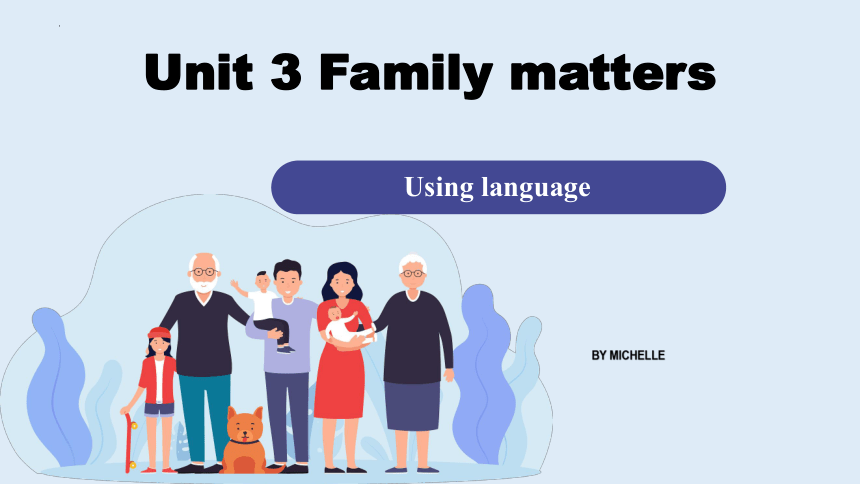 | |
| 格式 | pptx | ||
| 文件大小 | 36.5MB | ||
| 资源类型 | 教案 | ||
| 版本资源 | 外研版(2019) | ||
| 科目 | 英语 | ||
| 更新时间 | 2025-01-10 15:03:06 | ||
图片预览

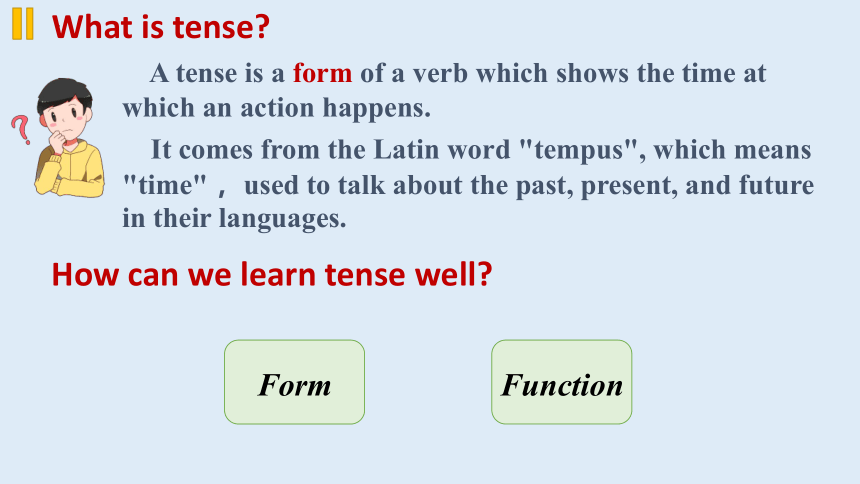
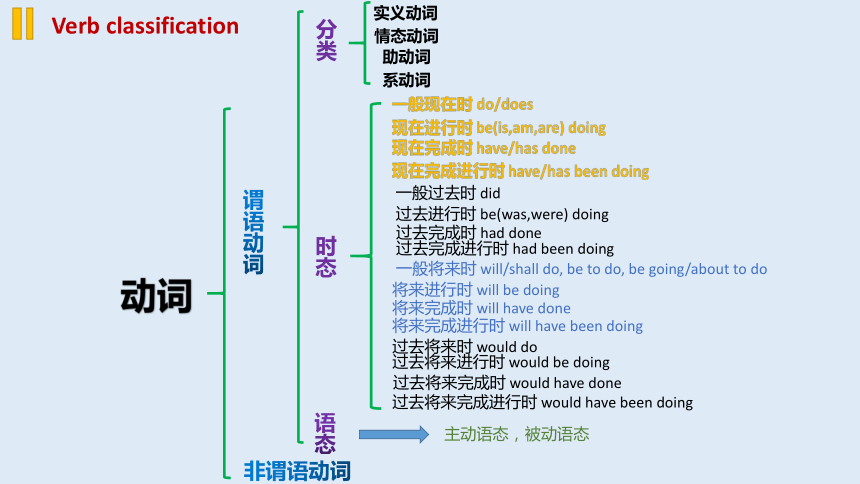


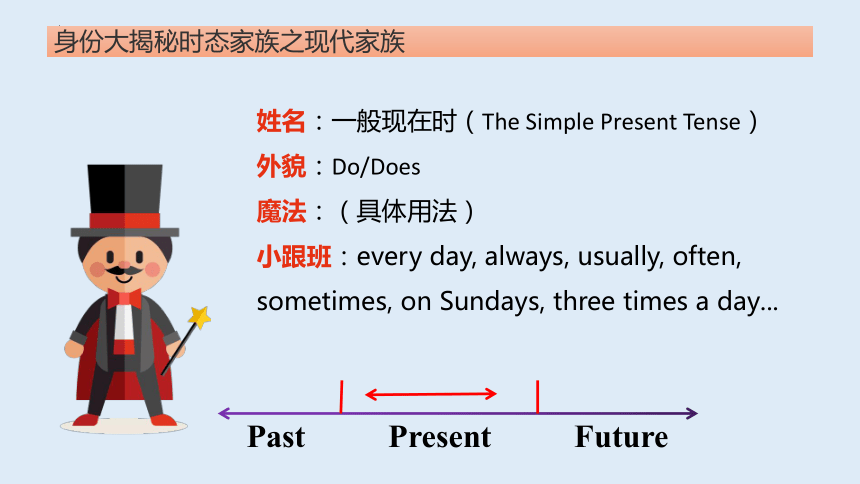
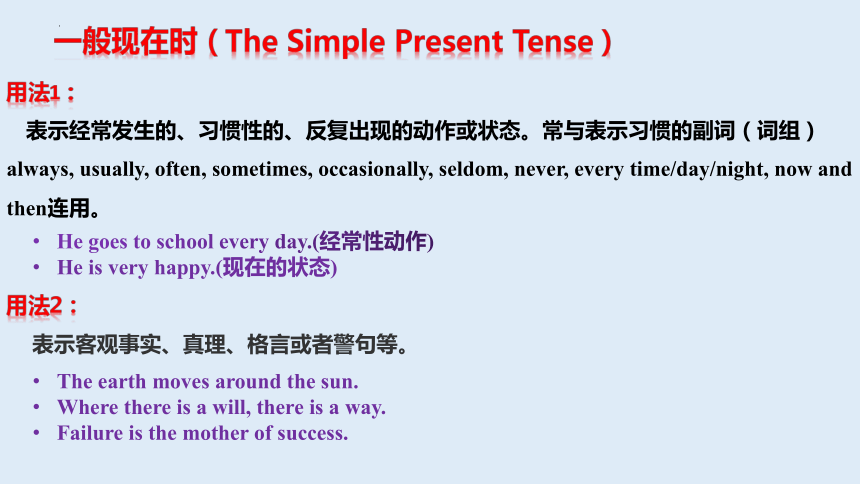
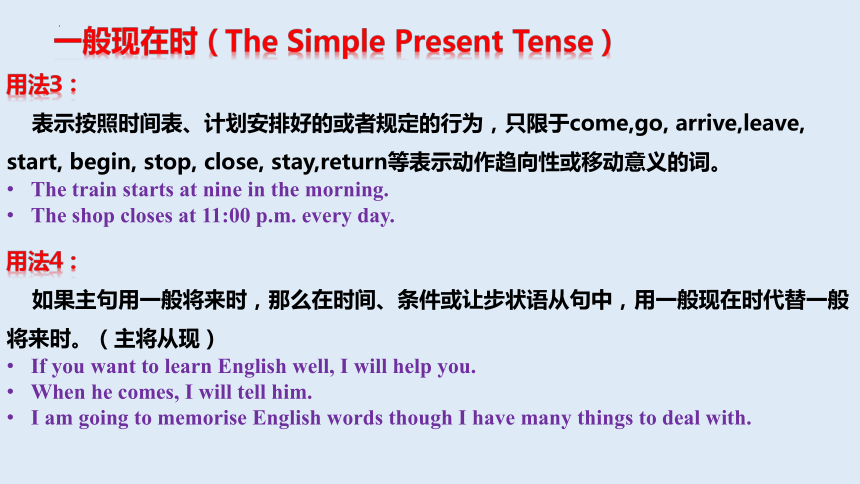

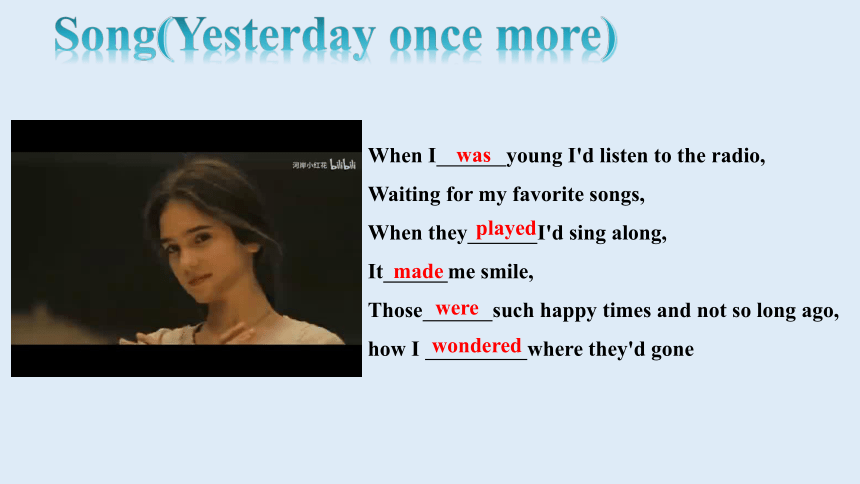

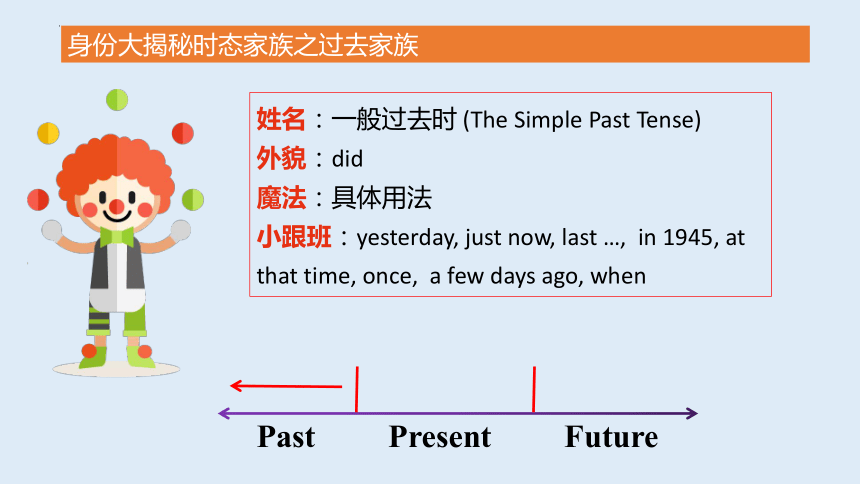
文档简介
(共57张PPT)
Using language
Unit 3 Family matters
BY MICHELLE
What is tense
A tense is a form of a verb which shows the time at which an action happens.
It comes from the Latin word "tempus", which means "time", used to talk about the past, present, and future in their languages.
How can we learn tense well
Form
Function
动词
谓语动词
分类
实义动词
情态动词
助动词
系动词
时态
一般现在时 do/does
现在进行时 be(is,am,are) doing
现在完成时 have/has done
现在完成进行时 have/has been doing
一般过去时 did
过去进行时 be(was,were) doing
过去完成时 had done
过去完成进行时 had been doing
一般将来时 will/shall do, be to do, be going/about to do
将来进行时 will be doing
将来完成时 will have done
将来完成进行时 will have been doing
过去将来时 would do
过去将来进行时 would be doing
过去将来完成时 would have done
过去将来完成进行时 would have been doing
语态
主动语态,被动语态
非谓语动词
Verb classification
Song (You Are My Sunshine)
You my sunshine my only sunshine
You me happy when skies gray
You’ll never know dear how much I you
Please don’t my sunshine away
are
make
are
love
take
...
Q:你知道空格里的动词体现的是什么时态吗?
身份大揭秘时态家族之现代家族
姓名:一般现在时(The Simple Present Tense)
外貌:Do/Does
魔法:(具体用法)
小跟班:every day, always, usually, often, sometimes, on Sundays, three times a day...
Past
Present
Future
一般现在时(The Simple Present Tense)
用法1:
表示经常发生的、习惯性的、反复出现的动作或状态。常与表示习惯的副词(词组)always, usually, often, sometimes, occasionally, seldom, never, every time/day/night, now and then连用。
He goes to school every day.(经常性动作)
He is very happy.(现在的状态)
用法2:
表示客观事实、真理、格言或者警句等。
The earth moves around the sun.
Where there is a will, there is a way.
Failure is the mother of success.
一般现在时(The Simple Present Tense)
用法3:
表示按照时间表、计划安排好的或者规定的行为,只限于come,go, arrive,leave, start, begin, stop, close, stay,return等表示动作趋向性或移动意义的词。
The train starts at nine in the morning.
The shop closes at 11:00 p.m. every day.
用法4:
如果主句用一般将来时,那么在时间、条件或让步状语从句中,用一般现在时代替一般将来时。(主将从现)
If you want to learn English well, I will help you.
When he comes, I will tell him.
I am going to memorise English words though I have many things to deal with.
动词第三人称单数的构成
一般情况直接加---s work---works
get---gets
say---says
read---reads
结尾为-s, -x, -sh, -ch 或 -o, 在词尾加 -es discuss---discusses
wash---washes
teach---teaches
go---goes
结尾为“辅音字母 + y ”, 变 y 为 i 再加 -es study---studies
try---tries
carry---carries
cry---cries
Song(Yesterday once more)
When I young I'd listen to the radio,
Waiting for my favorite songs,
When they I'd sing along,
It me smile,
Those such happy times and not so long ago,
how I where they'd gone
was
played
made
were
wondered
...
Q:你知道空格里的动词体现的是什么时态吗?
身份大揭秘时态家族之过去家族
姓名:一般过去时 (The Simple Past Tense)
外貌:did
魔法:具体用法
小跟班:yesterday, just now, last …, in 1945, at that time, once, a few days ago, when
Past
Present
Future
用法1:
表示过去某个时间发生的动作或存在的状态;表示过去一段时间内经常性或习惯性的动作。常与 ago,yesterday, the other day(前几天),the day before yesterday(前天),in 2018, last year / month / week...连用。
I met him yesterday.
We started school two months ago.
一般过去时 (The Simple Past Tense)
用法2:
表达“原以为/本来认为/原希望”等意义时,know, think, expect,want 等动词常用一般过去时。
I didn’t know you played the piano.
I thought I would see you here.
动词过去式的构成
一般情况在动词后加---ed work---worked
play---playedd
want---wanted
以不发音的 ---e 结尾的动词后加---d hope---hoped
like---liked
以“辅音字母 + y” 结尾的动词,变 y 为 i 再加---ed study---studied
try---tried
以重读闭音节或 /r/ 音节结尾,词尾只有一个辅音字母时,双写词尾的辅音字母再加---ed stop---stopped
prefer---preferred
refer---referred
admit---admitted
permit---permitted
Song(Monsters)
I see your monsters, I see your pain
Tell me your problems, I them away
I your lighthouse, I it okay
When I see your monsters
I there so brave, and chase them all away
will chase
will be
will make
will stand
...
Q:你知道空格里的动词体现的是什么时态吗?
身份大揭秘时态家族之将来家族
姓名:一般将来时 (The Simple Future Tense)
外貌:will/shall +do; be going to+ do;
be to + do; be about to + do
魔法: 具体用法
小跟班:tomorrow, in three days, this…, next…, soon...
Past
Present
Future
一般将来时 (The Simple Future Tense)
用法1:
“will / shall + 动词原形” 表示带意愿色彩或客观上要发生的事;也可表示说话时临时做出的决定。常与 later (on)“后来”,soon, in + 一段时间,next time/month/year, from now on(从现在开始),tomorrow等连用。
I will do my best if you give me a chance.
I will study English from now on.
用法2:
“be going to + 动词原形”表示按计划、打算要做某事;或根据某种迹象预示着要发生某事。
It is going to rain soon.
We are going to have a meeting soon.
一般将来时 (The Simple Future Tense)
用法3:
“be about to + 动词原形 ” 表示刚要做某事、马上要做某事、正要做某事,动作即将发生;不和表示将来的时间状语连用。(常见用法:be about to do...when... “正要做...这时...”)
We are about to discuss this problem.
I was about to sleep in English class when my headteacher came in.
用法4:
“be to + 动词原形” 表示按计划、安排或者按职责、义务和要求必须去做的事或即将发生的动作。
The president is to visit other countries.
You are to hand in English homework by 10 o’clock.
一般将来时 (The Simple Future Tense)
特殊用法:
1.一般现在时表示将来
(1)按照计划或时刻表要发生的事情。
The new library opens next month. 新图书馆下月开放。
The plane takes off at 3:00 P.m. 飞机于下午三点起飞。
(2)在条件状语从句和时间状语从句中用一般现在时表将来。
If you leave tomorrow , I’ll see you at the airport. 如果你明天走,我到机场送你。
When she comes, I’ll tell her about it. 她来时我将把这件事告诉她。
2.现在进行时表将来
现在进行时表示将来,往往是指计划好或准备要做的事。一些表示动作转换的终止性动词,如go, come, leave, start, begin,stay,take off,arrive等,或者也称为位移性动词,其进行时表示马上要做某事。
I am taking you to the zoo this Sunday. 这个周日我将带你们去动物园。
We are leaving school in three years.我们三年后就要毕业了。
Song(Lemon Tree)
I here in a boring room
It's just another rainy Sunday afternoon
I my time, I got nothing to do
I around, I for you
But nothing ever happens and I wonder,
I around in my car
I too fast, I too far
I'd like to change my point of view,
I feel so lonely, I for you
am sitting
am wasting
am hanging
am waiting
am driving
am driving
am driving
am waiting
...
Q:你知道空格里的动词体现的是什么时态吗?
身份大揭秘时态家族之进行家族
姓名:进行时(The Continuous Tense)
外貌:be + doing
魔法:具体用法
小跟班:now,at that time/moment, at this time yesterday...
Past
Present
Future
现在进行时 (The Present Continuous Tense)
用法1:
由“be(is/am/are) + 动词---ing(现在分词)”构成。表示说话时正在进行或者表示现阶段正在进行的动作。
Look!Someone is sleeping.
We are studying grammer these days.
用法2:
“系动词 + 介词/副词”也可以表示现在进行的意义。动词go, come, leave, arrive, start, begin, end 等表示将要发生的动作也可用于进行时。
Our school is under construction.
We are leaving for Shanghai.
过去进行时 (The Past Continuous Tense)
用法:
由“be(was/were) + 动词---ing(现在分词)”构成。表示过去某一时刻或某一段时间内正在进行的动作。常与表示过去的时间状语:at that time/moment, at this time yesterday, at ten o’clock yesterday...连用。(常见用法:be doing...when... “正在...这时...”)
We were having military training last month.
He was reading a novel when I called him.
进行时 (The Continuous Tense)
下列动词不宜用于进行时:
(1)感觉类:look, smell, feel, sound, taste, see, hear...
(2)感情类:like, love, prefer, admire, hate, fear...
(3)所属类:have, contain, own, hold, belong to...
现在分词的构成
一般情况在词尾直接加---ing work---working
study---studying
以不发音的 e 结尾的动词,去 e 再加 ---ing write---writing
take---taking
face---facing
“辅音 + 元音 + 辅音”结尾的重读闭音节词,且末尾只有一个辅音字母,双写词尾辅音字母,再加---ing cut---cutting
begin---beginning
run---running
put---putting
plan---planning
以---ie 结尾的动词,变 ---ie 为 y 再加---ing lie---lying
die---dying
Song(Seasons in the Sun)
Goodbye to you my trusted friend
each other
Since we were nine or ten
Together hills and trees
Learned of love and ABC s
Skinned our hearts and skinned our knees
Goodbye my friend it s hard to die
When all the birds are singing in the sky
Now that spring is in the air
We’ve known
we’ve climbed
...
Q:你知道空格里的动词体现的是什么时态吗?
身份大揭秘时态家族之完成家族
姓名:现在完成时(The Present Perfect Tense)
外貌:have/has done
魔法:(具体用法)
小跟班:already, lately, never, just, before, recently,ever...
Past
Present
Future
现在完成时(The Present Perfect Tense)
用法1:
“have / has + done” 。表示动作发生在过去某个不确定的时间,到现在已经完成,却给现在留下某种影响或结果,即表示因果关系,动作的完成是因,现在的情况是果。常与时间状语:already,just, yet, never, before, lately, recently, ever, never, often 等连用。
We have memorised 200 English words recently.
I have already mastered this tense.
用法2:
表示从过去某时开始而延续至今(可能还要延续下去)的动作或状态。常与 since + 过去时间点,for + 时间段,so far, up to now, till now, in the last/past few years, in recent years, these few days等连用。
We have learnt English for 10 years.
He has lived here since 1995.
现在完成时(The Present Perfect Tense)
牢记固定句型:
(1)It is / has been + 时间段 + since...
“自从...以来已经...”
(2)This / It / That is the first / second / third...time (that)...
“这是/那是(某人)第几次做某事”
It is / has been 1 year since I graduated from the senior high.
This is the first time (that) I have failed.
易混淆时态区分
一般过去时态 现在完成时态
用法 已结束 不强调过程和结果。 单纯描述事件。 已结束
强调结果或影响。
不只是描述事件。
结构 was/were/did have/has+done
Summary
Spin the wheel.
You have 10 seconds to make a sentence with the words given using the pointed tense.
TIME’S UP
0
1
2
3
4
5
6
7
8
9
10
Tom finished his homework.
Tom
finish
homework
CHECK
6/15
TIME’S UP
0
1
2
3
4
5
6
7
8
9
10
Mary has finished her homework.
Mary
finish
homework
CHECK
2/15
TIME’S UP
0
1
2
3
4
5
6
7
8
9
10
Will Mary finish her homework
Mary
finish
homework
CHECK
8/15
TIME’S UP
0
1
2
3
4
5
6
7
8
9
10
We were playing basketball.
we
play
basketball
CHECK
7/15
Look at the sentences from the reading passage. Decide which tense each is in and match the tenses to what they describe.
Activity 1
a Grandfather and Father,
seated at the table, are
playing chess.
b Lawyers help people
and are respected by
others.
c …you said that you
wanted to be a
professional football
player.
d … you have found the
career that suits your
talents.
e …you will have two
options for your future.
1 Something that started
in the past and is
affecting the present.
2 Something that is
currently taking place.
3 Something that is
certain to take place in
the future.
4 Something that was
completed in the past
5 Something that happens
regularly in the present.
Activity 1
Now match the sentences to the correct timelines .
a Grandfather and Father,
seated at the table, are
playing chess.
b Lawyers help people
and are respected by
others.
c …you said that you
wanted to be a
professional football
player.
d … you have found the
career that suits your
talents.
e …you will have two
options for your future.
现在进行时
一般现在时
一般过去时
现在完成时
一般将来时
Complete the dialogue with the correct form of the words and expressions in brackets.
Activity 2
has
called
will throw
will give
are going to throw
am going to give
likes
am thinking of
will love
have
finished
Look at the checklist for Grandma’s birthday party and talk about the preparations.
They have decided to throw a party to celebrate Grandma’s birthday...
Activity 3
Present your paragraph to the class.
They have decided to throw a party to celebrate Grandma’s birthday...
Sample
Possible version:
They have decided to throw a party to celebrate Grandma’s birthday. They have all chosen presents for Grandma. Dad drew up the guest list on Wednesday, and he is now making the invitations. Mum will prepare food and drinks for the party on Sunday morning.
Activity 4
What did Penny’s dad look like ten years ago
He was quite thin and pale. He had red, bushy hair and a square jaw.
2. What does Penny’s mum look like now and why
She looks almost the same as she did ten years ago, with smooth skin and straight black hair, because jogging has kept her slim and fit.
3. How does Penny look different now compared to ten years ago
Her hair has got a lot longer and she wears it in a ponytail. She also has freckles on her cheeks now.
Physical appearances
Activity 5
Face Hair Skin Height and build
square jaw
red beard
rosy cheeks
freckles
red
bushy
grey
straight
black
ponytail
long
pale
tanned
smooth
light
thin
well-built
slim
fit
Underline the words and expressions used to describe appearances in Activity 4 and put them into the table. And any more you can think of.
Activity 6
Work in pairs and describe how your family members’ physical appearances have changed.
My mother was / had... Now she is / has got...
Saying sorry to family members
How are you getting along with your family
harmonious
Not harmonious
b, d, f
Activity 7 Listen to the conversation and choose the feelings that the speakers express.
Activity 8
1 school play
2 off sick
3 tired and pale
4 relax
5 countryside
6 picnic
7 catch up
Now talk about how Alice’s mother makes an apology.
Listen again and complete Alice’s joural entry.
听力原文:
Alice: (sadly)Mum, it's me...
Mum: Alice What's wrong You sound upset.
Alice: ( sadly)I knew it.
Mum: Oh, no! I forgot, didn't I Your concert was today, and I missed it
Alice: It wasn't a concert. It was the school play. And yes, you missed it.
Mum: Alice, I'm so sorry! I was really busy with work. Someone was off sick, so I had to do his work, too.
Alice: Couldn't you have asked someone else to do it I know work is very important to you, it's just.. Everyone said I was really good in the play. I wanted you to see it, too
Mum: I'm sorry I didn't make it, dear. You worked so hard on your part, and I'm so proud of you. I should have been there. I promise I'll never do it again! Can you forgive me
Alice: It's all right. I understand you're very busy. But you've worked so much recently. You need some time off to relax. I don't like seeing you so tired and pale.
Mum: I know, dear. Perhaps next week I could take a day off, and we could go to the countryside.
Alice: (happily) That sounds wonderful! We can go camping and have a picnic in the hills.
Mum: And we can really talk and catch up!
Alice: I'd love that!
Mum: OK. I'll talk to my manager about it. Bye for now!
Alice: Bye, Mum! Love you!
Activity 9
Work in pairs. Act out the conversation to apologise to a family member.
Activity 10 Work in pairs. Think about another situation in which you need to make an apology and have a similar conversation.
Learning to learn
Placing stress on particular words can have a big impact on the meaning and strength of apologies. For example. Saying “I am sorry” has more of an impact than “I’m sorry”. Another way of strengthening an apology is by using and stressing adverbs: I’m really sorry, I’m so sorry.
Review tenses and do more exercises about them.
Memorize the words and expressions related to physical appearance and then try to use them to describe people around you.
【Homework】
THANKS FOR WATCHING
Using language
Unit 3 Family matters
BY MICHELLE
What is tense
A tense is a form of a verb which shows the time at which an action happens.
It comes from the Latin word "tempus", which means "time", used to talk about the past, present, and future in their languages.
How can we learn tense well
Form
Function
动词
谓语动词
分类
实义动词
情态动词
助动词
系动词
时态
一般现在时 do/does
现在进行时 be(is,am,are) doing
现在完成时 have/has done
现在完成进行时 have/has been doing
一般过去时 did
过去进行时 be(was,were) doing
过去完成时 had done
过去完成进行时 had been doing
一般将来时 will/shall do, be to do, be going/about to do
将来进行时 will be doing
将来完成时 will have done
将来完成进行时 will have been doing
过去将来时 would do
过去将来进行时 would be doing
过去将来完成时 would have done
过去将来完成进行时 would have been doing
语态
主动语态,被动语态
非谓语动词
Verb classification
Song (You Are My Sunshine)
You my sunshine my only sunshine
You me happy when skies gray
You’ll never know dear how much I you
Please don’t my sunshine away
are
make
are
love
take
...
Q:你知道空格里的动词体现的是什么时态吗?
身份大揭秘时态家族之现代家族
姓名:一般现在时(The Simple Present Tense)
外貌:Do/Does
魔法:(具体用法)
小跟班:every day, always, usually, often, sometimes, on Sundays, three times a day...
Past
Present
Future
一般现在时(The Simple Present Tense)
用法1:
表示经常发生的、习惯性的、反复出现的动作或状态。常与表示习惯的副词(词组)always, usually, often, sometimes, occasionally, seldom, never, every time/day/night, now and then连用。
He goes to school every day.(经常性动作)
He is very happy.(现在的状态)
用法2:
表示客观事实、真理、格言或者警句等。
The earth moves around the sun.
Where there is a will, there is a way.
Failure is the mother of success.
一般现在时(The Simple Present Tense)
用法3:
表示按照时间表、计划安排好的或者规定的行为,只限于come,go, arrive,leave, start, begin, stop, close, stay,return等表示动作趋向性或移动意义的词。
The train starts at nine in the morning.
The shop closes at 11:00 p.m. every day.
用法4:
如果主句用一般将来时,那么在时间、条件或让步状语从句中,用一般现在时代替一般将来时。(主将从现)
If you want to learn English well, I will help you.
When he comes, I will tell him.
I am going to memorise English words though I have many things to deal with.
动词第三人称单数的构成
一般情况直接加---s work---works
get---gets
say---says
read---reads
结尾为-s, -x, -sh, -ch 或 -o, 在词尾加 -es discuss---discusses
wash---washes
teach---teaches
go---goes
结尾为“辅音字母 + y ”, 变 y 为 i 再加 -es study---studies
try---tries
carry---carries
cry---cries
Song(Yesterday once more)
When I young I'd listen to the radio,
Waiting for my favorite songs,
When they I'd sing along,
It me smile,
Those such happy times and not so long ago,
how I where they'd gone
was
played
made
were
wondered
...
Q:你知道空格里的动词体现的是什么时态吗?
身份大揭秘时态家族之过去家族
姓名:一般过去时 (The Simple Past Tense)
外貌:did
魔法:具体用法
小跟班:yesterday, just now, last …, in 1945, at that time, once, a few days ago, when
Past
Present
Future
用法1:
表示过去某个时间发生的动作或存在的状态;表示过去一段时间内经常性或习惯性的动作。常与 ago,yesterday, the other day(前几天),the day before yesterday(前天),in 2018, last year / month / week...连用。
I met him yesterday.
We started school two months ago.
一般过去时 (The Simple Past Tense)
用法2:
表达“原以为/本来认为/原希望”等意义时,know, think, expect,want 等动词常用一般过去时。
I didn’t know you played the piano.
I thought I would see you here.
动词过去式的构成
一般情况在动词后加---ed work---worked
play---playedd
want---wanted
以不发音的 ---e 结尾的动词后加---d hope---hoped
like---liked
以“辅音字母 + y” 结尾的动词,变 y 为 i 再加---ed study---studied
try---tried
以重读闭音节或 /r/ 音节结尾,词尾只有一个辅音字母时,双写词尾的辅音字母再加---ed stop---stopped
prefer---preferred
refer---referred
admit---admitted
permit---permitted
Song(Monsters)
I see your monsters, I see your pain
Tell me your problems, I them away
I your lighthouse, I it okay
When I see your monsters
I there so brave, and chase them all away
will chase
will be
will make
will stand
...
Q:你知道空格里的动词体现的是什么时态吗?
身份大揭秘时态家族之将来家族
姓名:一般将来时 (The Simple Future Tense)
外貌:will/shall +do; be going to+ do;
be to + do; be about to + do
魔法: 具体用法
小跟班:tomorrow, in three days, this…, next…, soon...
Past
Present
Future
一般将来时 (The Simple Future Tense)
用法1:
“will / shall + 动词原形” 表示带意愿色彩或客观上要发生的事;也可表示说话时临时做出的决定。常与 later (on)“后来”,soon, in + 一段时间,next time/month/year, from now on(从现在开始),tomorrow等连用。
I will do my best if you give me a chance.
I will study English from now on.
用法2:
“be going to + 动词原形”表示按计划、打算要做某事;或根据某种迹象预示着要发生某事。
It is going to rain soon.
We are going to have a meeting soon.
一般将来时 (The Simple Future Tense)
用法3:
“be about to + 动词原形 ” 表示刚要做某事、马上要做某事、正要做某事,动作即将发生;不和表示将来的时间状语连用。(常见用法:be about to do...when... “正要做...这时...”)
We are about to discuss this problem.
I was about to sleep in English class when my headteacher came in.
用法4:
“be to + 动词原形” 表示按计划、安排或者按职责、义务和要求必须去做的事或即将发生的动作。
The president is to visit other countries.
You are to hand in English homework by 10 o’clock.
一般将来时 (The Simple Future Tense)
特殊用法:
1.一般现在时表示将来
(1)按照计划或时刻表要发生的事情。
The new library opens next month. 新图书馆下月开放。
The plane takes off at 3:00 P.m. 飞机于下午三点起飞。
(2)在条件状语从句和时间状语从句中用一般现在时表将来。
If you leave tomorrow , I’ll see you at the airport. 如果你明天走,我到机场送你。
When she comes, I’ll tell her about it. 她来时我将把这件事告诉她。
2.现在进行时表将来
现在进行时表示将来,往往是指计划好或准备要做的事。一些表示动作转换的终止性动词,如go, come, leave, start, begin,stay,take off,arrive等,或者也称为位移性动词,其进行时表示马上要做某事。
I am taking you to the zoo this Sunday. 这个周日我将带你们去动物园。
We are leaving school in three years.我们三年后就要毕业了。
Song(Lemon Tree)
I here in a boring room
It's just another rainy Sunday afternoon
I my time, I got nothing to do
I around, I for you
But nothing ever happens and I wonder,
I around in my car
I too fast, I too far
I'd like to change my point of view,
I feel so lonely, I for you
am sitting
am wasting
am hanging
am waiting
am driving
am driving
am driving
am waiting
...
Q:你知道空格里的动词体现的是什么时态吗?
身份大揭秘时态家族之进行家族
姓名:进行时(The Continuous Tense)
外貌:be + doing
魔法:具体用法
小跟班:now,at that time/moment, at this time yesterday...
Past
Present
Future
现在进行时 (The Present Continuous Tense)
用法1:
由“be(is/am/are) + 动词---ing(现在分词)”构成。表示说话时正在进行或者表示现阶段正在进行的动作。
Look!Someone is sleeping.
We are studying grammer these days.
用法2:
“系动词 + 介词/副词”也可以表示现在进行的意义。动词go, come, leave, arrive, start, begin, end 等表示将要发生的动作也可用于进行时。
Our school is under construction.
We are leaving for Shanghai.
过去进行时 (The Past Continuous Tense)
用法:
由“be(was/were) + 动词---ing(现在分词)”构成。表示过去某一时刻或某一段时间内正在进行的动作。常与表示过去的时间状语:at that time/moment, at this time yesterday, at ten o’clock yesterday...连用。(常见用法:be doing...when... “正在...这时...”)
We were having military training last month.
He was reading a novel when I called him.
进行时 (The Continuous Tense)
下列动词不宜用于进行时:
(1)感觉类:look, smell, feel, sound, taste, see, hear...
(2)感情类:like, love, prefer, admire, hate, fear...
(3)所属类:have, contain, own, hold, belong to...
现在分词的构成
一般情况在词尾直接加---ing work---working
study---studying
以不发音的 e 结尾的动词,去 e 再加 ---ing write---writing
take---taking
face---facing
“辅音 + 元音 + 辅音”结尾的重读闭音节词,且末尾只有一个辅音字母,双写词尾辅音字母,再加---ing cut---cutting
begin---beginning
run---running
put---putting
plan---planning
以---ie 结尾的动词,变 ---ie 为 y 再加---ing lie---lying
die---dying
Song(Seasons in the Sun)
Goodbye to you my trusted friend
each other
Since we were nine or ten
Together hills and trees
Learned of love and ABC s
Skinned our hearts and skinned our knees
Goodbye my friend it s hard to die
When all the birds are singing in the sky
Now that spring is in the air
We’ve known
we’ve climbed
...
Q:你知道空格里的动词体现的是什么时态吗?
身份大揭秘时态家族之完成家族
姓名:现在完成时(The Present Perfect Tense)
外貌:have/has done
魔法:(具体用法)
小跟班:already, lately, never, just, before, recently,ever...
Past
Present
Future
现在完成时(The Present Perfect Tense)
用法1:
“have / has + done” 。表示动作发生在过去某个不确定的时间,到现在已经完成,却给现在留下某种影响或结果,即表示因果关系,动作的完成是因,现在的情况是果。常与时间状语:already,just, yet, never, before, lately, recently, ever, never, often 等连用。
We have memorised 200 English words recently.
I have already mastered this tense.
用法2:
表示从过去某时开始而延续至今(可能还要延续下去)的动作或状态。常与 since + 过去时间点,for + 时间段,so far, up to now, till now, in the last/past few years, in recent years, these few days等连用。
We have learnt English for 10 years.
He has lived here since 1995.
现在完成时(The Present Perfect Tense)
牢记固定句型:
(1)It is / has been + 时间段 + since...
“自从...以来已经...”
(2)This / It / That is the first / second / third...time (that)...
“这是/那是(某人)第几次做某事”
It is / has been 1 year since I graduated from the senior high.
This is the first time (that) I have failed.
易混淆时态区分
一般过去时态 现在完成时态
用法 已结束 不强调过程和结果。 单纯描述事件。 已结束
强调结果或影响。
不只是描述事件。
结构 was/were/did have/has+done
Summary
Spin the wheel.
You have 10 seconds to make a sentence with the words given using the pointed tense.
TIME’S UP
0
1
2
3
4
5
6
7
8
9
10
Tom finished his homework.
Tom
finish
homework
CHECK
6/15
TIME’S UP
0
1
2
3
4
5
6
7
8
9
10
Mary has finished her homework.
Mary
finish
homework
CHECK
2/15
TIME’S UP
0
1
2
3
4
5
6
7
8
9
10
Will Mary finish her homework
Mary
finish
homework
CHECK
8/15
TIME’S UP
0
1
2
3
4
5
6
7
8
9
10
We were playing basketball.
we
play
basketball
CHECK
7/15
Look at the sentences from the reading passage. Decide which tense each is in and match the tenses to what they describe.
Activity 1
a Grandfather and Father,
seated at the table, are
playing chess.
b Lawyers help people
and are respected by
others.
c …you said that you
wanted to be a
professional football
player.
d … you have found the
career that suits your
talents.
e …you will have two
options for your future.
1 Something that started
in the past and is
affecting the present.
2 Something that is
currently taking place.
3 Something that is
certain to take place in
the future.
4 Something that was
completed in the past
5 Something that happens
regularly in the present.
Activity 1
Now match the sentences to the correct timelines .
a Grandfather and Father,
seated at the table, are
playing chess.
b Lawyers help people
and are respected by
others.
c …you said that you
wanted to be a
professional football
player.
d … you have found the
career that suits your
talents.
e …you will have two
options for your future.
现在进行时
一般现在时
一般过去时
现在完成时
一般将来时
Complete the dialogue with the correct form of the words and expressions in brackets.
Activity 2
has
called
will throw
will give
are going to throw
am going to give
likes
am thinking of
will love
have
finished
Look at the checklist for Grandma’s birthday party and talk about the preparations.
They have decided to throw a party to celebrate Grandma’s birthday...
Activity 3
Present your paragraph to the class.
They have decided to throw a party to celebrate Grandma’s birthday...
Sample
Possible version:
They have decided to throw a party to celebrate Grandma’s birthday. They have all chosen presents for Grandma. Dad drew up the guest list on Wednesday, and he is now making the invitations. Mum will prepare food and drinks for the party on Sunday morning.
Activity 4
What did Penny’s dad look like ten years ago
He was quite thin and pale. He had red, bushy hair and a square jaw.
2. What does Penny’s mum look like now and why
She looks almost the same as she did ten years ago, with smooth skin and straight black hair, because jogging has kept her slim and fit.
3. How does Penny look different now compared to ten years ago
Her hair has got a lot longer and she wears it in a ponytail. She also has freckles on her cheeks now.
Physical appearances
Activity 5
Face Hair Skin Height and build
square jaw
red beard
rosy cheeks
freckles
red
bushy
grey
straight
black
ponytail
long
pale
tanned
smooth
light
thin
well-built
slim
fit
Underline the words and expressions used to describe appearances in Activity 4 and put them into the table. And any more you can think of.
Activity 6
Work in pairs and describe how your family members’ physical appearances have changed.
My mother was / had... Now she is / has got...
Saying sorry to family members
How are you getting along with your family
harmonious
Not harmonious
b, d, f
Activity 7 Listen to the conversation and choose the feelings that the speakers express.
Activity 8
1 school play
2 off sick
3 tired and pale
4 relax
5 countryside
6 picnic
7 catch up
Now talk about how Alice’s mother makes an apology.
Listen again and complete Alice’s joural entry.
听力原文:
Alice: (sadly)Mum, it's me...
Mum: Alice What's wrong You sound upset.
Alice: ( sadly)I knew it.
Mum: Oh, no! I forgot, didn't I Your concert was today, and I missed it
Alice: It wasn't a concert. It was the school play. And yes, you missed it.
Mum: Alice, I'm so sorry! I was really busy with work. Someone was off sick, so I had to do his work, too.
Alice: Couldn't you have asked someone else to do it I know work is very important to you, it's just.. Everyone said I was really good in the play. I wanted you to see it, too
Mum: I'm sorry I didn't make it, dear. You worked so hard on your part, and I'm so proud of you. I should have been there. I promise I'll never do it again! Can you forgive me
Alice: It's all right. I understand you're very busy. But you've worked so much recently. You need some time off to relax. I don't like seeing you so tired and pale.
Mum: I know, dear. Perhaps next week I could take a day off, and we could go to the countryside.
Alice: (happily) That sounds wonderful! We can go camping and have a picnic in the hills.
Mum: And we can really talk and catch up!
Alice: I'd love that!
Mum: OK. I'll talk to my manager about it. Bye for now!
Alice: Bye, Mum! Love you!
Activity 9
Work in pairs. Act out the conversation to apologise to a family member.
Activity 10 Work in pairs. Think about another situation in which you need to make an apology and have a similar conversation.
Learning to learn
Placing stress on particular words can have a big impact on the meaning and strength of apologies. For example. Saying “I am sorry” has more of an impact than “I’m sorry”. Another way of strengthening an apology is by using and stressing adverbs: I’m really sorry, I’m so sorry.
Review tenses and do more exercises about them.
Memorize the words and expressions related to physical appearance and then try to use them to describe people around you.
【Homework】
THANKS FOR WATCHING
